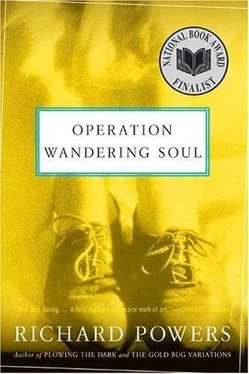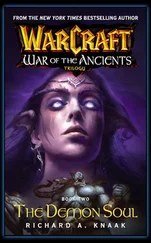Richard Powers - Operation Wandering Soul
Здесь есть возможность читать онлайн «Richard Powers - Operation Wandering Soul» весь текст электронной книги совершенно бесплатно (целиком полную версию без сокращений). В некоторых случаях можно слушать аудио, скачать через торрент в формате fb2 и присутствует краткое содержание. Год выпуска: 2002, Издательство: Harper Perennial, Жанр: Современная проза, на английском языке. Описание произведения, (предисловие) а так же отзывы посетителей доступны на портале библиотеки ЛибКат.
- Название:Operation Wandering Soul
- Автор:
- Издательство:Harper Perennial
- Жанр:
- Год:2002
- ISBN:нет данных
- Рейтинг книги:5 / 5. Голосов: 1
-
Избранное:Добавить в избранное
- Отзывы:
-
Ваша оценка:
- 100
- 1
- 2
- 3
- 4
- 5
Operation Wandering Soul: краткое содержание, описание и аннотация
Предлагаем к чтению аннотацию, описание, краткое содержание или предисловие (зависит от того, что написал сам автор книги «Operation Wandering Soul»). Если вы не нашли необходимую информацию о книге — напишите в комментариях, мы постараемся отыскать её.
Operation Wandering Soul — читать онлайн бесплатно полную книгу (весь текст) целиком
Ниже представлен текст книги, разбитый по страницам. Система сохранения места последней прочитанной страницы, позволяет с удобством читать онлайн бесплатно книгу «Operation Wandering Soul», без необходимости каждый раз заново искать на чём Вы остановились. Поставьте закладку, и сможете в любой момент перейти на страницу, на которой закончили чтение.
Интервал:
Закладка:
In early February 1534, the merchant Knipperdollinck and the Dutchman Jan Beuckelson (John of Leiden) ran screaming through the city's streets calling on people to repent. They managed to provoke an armed uprising of converted Anabaptists, who took over the town hall. The council, weakened by infighting and filled with Lutherans eager to protect their own freedom of worship, did nothing to oppose the revolt. Assisted by the arrival of his spiritual master, the gaunt, bearded ascetic Jan Matthys of Haarlem, Beuckelson rapidly took over. Armed mobs ejected all misbelievers from the town, appropriating their property and condemning to a February snowstorm a stream of dispossessed, including expectant mothers and infants.
The Dutch proclaimers of the Second Coming were left to establish an absolute theocracy, a divinely inspired island of the Chosen amid history's final deluge. Matthys began implementing the Utopian communalism that would for a few months turn the city insane. Private money was abolished, and property was commonly distributed. All books except the Bible were set ablaze on a pyre in the cathedral square. Public execution of dissenting voices took place to the accompaniment of hymns.
To restore order, the bishop of Münster threw up earthworks around the town. But his forces were too weak to lay a fully effective siege. On Easter, Matthys, now absolute dictator of the city, claiming divine assurance of success, rode out with a handful of men to scatter the besieging army. Matthys and his suicidal squad were sliced apart without mercy.
Back inside the walls, the cloak of leadership fell to Beuckelson. Obeying mystic revelations, he implemented a strict rotation of labor and appointed a governing body of twelve elders. He instituted polygamy and compelled all women under a certain age to marry. By year's end, polygamy had devolved into a kind of mandatory, rampant promiscuity. Beuckelson so inflamed his little garrison of two thousand men that they repeatedly withstood the attacks of episcopal forces several times their size.
In September, a goldsmith named Dusentschur stood in the Prin-zipalmarkt and announced that God had chosen Beuckelson as king of kings, ruler of all the nations of earth, and Messiah of the Last Days. Such was Beuckelson promptly ordained, to increasing murmurs among the fanfare. Streets, gates, days of the week, even children were all given new names. An ornamental coinage was struck, and Beuckelson surrounded himself with the trappings of an ornate fantasy court. While requisitioning goods from the poor to pay for this splendor, the new king assured them that the day was at hand when stones would be turned to bread and mud into gold. The Third Age was here, when the Children of God would inherit an earth richer than their wildest dreams.
Sympathetic Anabaptist uprisings erupted across the North. At last realizing the scale of events at Münster, the states of the empire joined together in sending money and soldiers to topple Beuckelson's messianic kingdom. By the time Klotz arrived to seal off the blockade in January of 1535, life inside the city had descended into a last, macabre nightmare. Fantastic feats of stagecraft were devised for the starving populace — athletic tournaments, masques, obscene masses performed in the cathedral. Trumpeters went about delivering concerted blasts at all hours, the signal for townsfolk to assemble in the square, under penalty of death, and listen to the king's latest inspirations.
Much of what Klotz describes, however fantastic, is corroborated by sources inside the walls. In May, Beuckelson began resorting to mass executions of his starving, hysterical subjects. Many believers were ready to be transported up to heaven along with him. At first, those who came to their senses were allowed to leave the city, but the imperial forces refused to let them through the siege lines. Klotz describes how these creatures crawled about like animals in the moat between the city walls and the besieging earthworks, grazing on grass, begging to be put to death. These were the lucky ones; subsequent defectors were quartered and nailed up about town.
Klotz's task was to shell the northern ramparts along the Buddenturm with cannonades of leaflets, imploring the citizens of the town to turn on their king and thus avoid a massacre. He reports that by the siege's gruesome end, the desperate garrison had been whittled down to starved children. When the besiegers finally pierced the city and overcame the last, fanatical defense, they had to pick their way through carnage beyond imagining. Stacks of corpses lined the streets, most so mutilated by execution, scavenging, or disease that the aged could not be told from the young.
The surviving Anabaptist leaders, Beuckelson and Knipperdol-linck, were singed to death with red-hot irons. Klotz reports that the king made no sound during his torture, nor did he recant. Their bodies were hung in lead cages from the spire of the Lambertikirche.
At precisely this time Michelangelo, old and misanthropic, embittered by history, returned to the Sistine Chapel, now free of San-gallo's sandbagging, to add to his ceiling's Creation a transforming footnote: the horrifying Last Judgment, that most pitiless work in Western art…
(Crayola flowers, houses, their chimneys curly with Prussian-blue smoke, some simple words, a girl's stick face, a fighter airplane spewing pudgy, rainbow caterpillars of bullets … )
Well, yes: of course. Through the arabesques of innocence's syllogisms, the conclusion grows obvious to him. Her insight shines as brightly as the pool of early reader flashlight under the covers at night. Kraft backtracks through the steps of her logic. And she has it weirdly right. Still adept, Joy infers what he has missed. The codger in the Dodger cap is not a little boy propelled into a sensationally aged body. Exactly the reverse. The new kid on the block is the Laotian myth-equivalent of Methuselah, a spirit older than entire generations who perversely refuses to detach himself from boyhood.
The explanation she comes up with is simpler, closer to the bone. A child shriveling from the husk inward still stays green in the core. She asks the boy's name. Kraft tells her, as if he, like Linda, has known the tag all along. He sees her roll the clinical syllables around on her tongue. She tries the name out loud: "Nicolino." Beyond doubt, one of the lost boys. Fell out of the perambulator in Kensington Gardens. Corroded by time in outward stuff, while remaining essentially untouched. All children, except one, grow up. I've seen him; he's just flown in the window of the ward.
"That book you gave me…" He knows what she struggles to protest: every word of it, the literal, documentary truth.
Kraft considers giving her Hutchinson-Gilford disease to add to the pile of homework assignments she keeps by the side of her bed. Prrogeria's Pan, the ward's most fantastic invalid ever, might outdo all the study texts she has so meticulously assembled. The boy who never grew up: brutal practicality leaves her no fiercer a fairy tale. Joy will need myth much more outrageous — absurdly, magically more — to live through the mystery ahead of her.
She will need to believe far worse, and wilder. Kraft can't even compose faith's prerequisite list, so deeply has measurement encroached on his own credence. She will need to hope that escalating pain has some surprise, hidden by design until the redeeming twist. She will have to keep believing that the physician she adores is not poisoning her for pleasure with sloe nausea fizzes and chemo chasers. Let her believe. Let her escape the exam constraints this once, buy in, subscribe to any prognostic faith that helps her account for the nursery damned. Believe any transparency at all rather than come to the one unskirtable truth Kraft himself would still deny if he could: that all children will grow up, except this believing one.
Читать дальшеИнтервал:
Закладка:
Похожие книги на «Operation Wandering Soul»
Представляем Вашему вниманию похожие книги на «Operation Wandering Soul» списком для выбора. Мы отобрали схожую по названию и смыслу литературу в надежде предоставить читателям больше вариантов отыскать новые, интересные, ещё непрочитанные произведения.
Обсуждение, отзывы о книге «Operation Wandering Soul» и просто собственные мнения читателей. Оставьте ваши комментарии, напишите, что Вы думаете о произведении, его смысле или главных героях. Укажите что конкретно понравилось, а что нет, и почему Вы так считаете.












